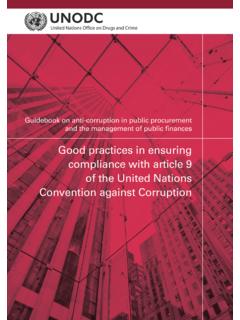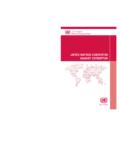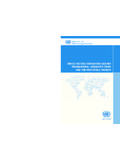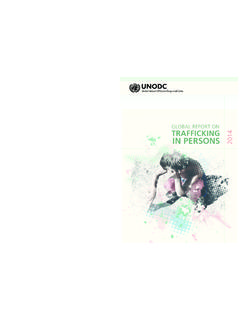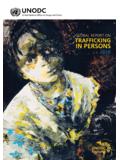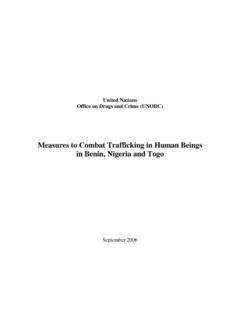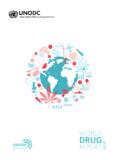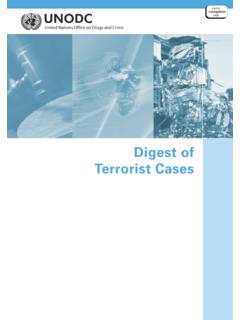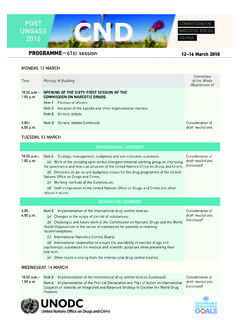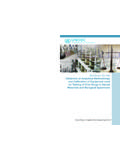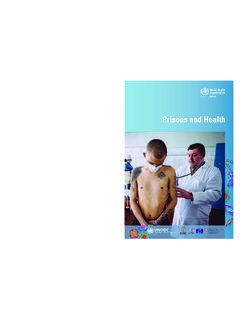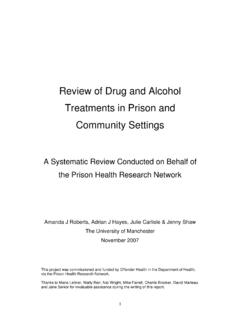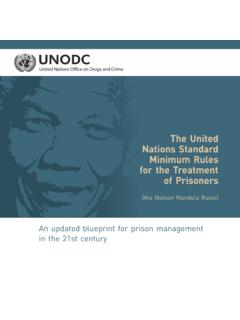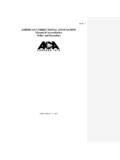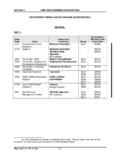Transcription of Assessing compliance with the Nelson Mandela Rules
1 Assessing compliance with the Nelson Mandela RulesA checklist for internal inspection mechanismsCRIMINAL JUSTICE HANDBOOK SERIESADVANCE COPYUNITED nations office ON DRUGS AND crime ViennaUNITED NATIONSNew York, 2017 Assessing compliance with the Nelson Mandela RulesA CHECKLIST FOR INTERNAL INSPECTION MECHANISMSiiiAcknowledgmentsThis checklist was written for the united nations office on Drugs and crime (UNODC) by Walter Suntinger, consultant on human rights and criminal justice, and Philipp Meissner (UNODC). Contributing throughout the development of the checklist were Miriam Beringmeier and Piera Barzan (UNODC).A first draft of the checklist was reviewed in the course of a meeting of the expert group on the review of guidance material on the Nelson Mandela Rules held in Vienna on 9 and 10 February 2017.
2 UNODC wishes to acknowledge the valuable contributions received from the following national experts who participated in the meeting: Adel Jumaa Mubarak Alhallawi Almaskari ( united Arab Emirates), Yousef Rashed Alkhanbouli ( united Arab Emirates), Ali Ben Aissa (Algeria), Andr Ferragne (France), Angelika Fichtinger (Austria), Maria Jolanta Grochulska (Poland), Esteban Mahiques (Argentina), Vuyelwa Christa Mlomo-Ndlovu (South Africa), Pee Eng Ong (Singapore), Juan Miguel Petit (Uruguay), Rick Raemisch ( united States of America), Jo o Vitor Rodrigues Loureiro (Brazil), Ruth Schr der (Germany) and Vitaya Suriyawang (Thailand).UNODC also wishes to acknowledge the valuable input provided by the following Expert Group participants from other united nations entities, international, regional and non- governmental organizations, and relevant research institutes as well as by the following indi-vidual experts.
3 Vincent Ballon (International Committee of the Red Cross), Moritz Birk (Ludwig Boltzmann Institute), Jean-S bastien Blanc (Association for the Prevention of Tor-ture), Lipi Chowdhury (Department of Peacekeeping Operations of the united nations Secretariat), Stefan Enggist (Federal Department of Home Affairs, Switzerland), Isak Enstrom ( united nations Development Programme), Emilio Gin s Santidri n (Subcommittee on Pre-vention of Torture and other Cruel, Inhuman or Degrading Treatment or Punishment), Andrea Huber (Penal Reform International), Agneta Johnson (Swedish Prison and Probation Service), Susanna Marietti (Antigone Onlus), Mary Murphy (International Committee of the Red Cross), Michael Neurauter (Council of Europe), Andra Nicolescu (American University), Josh Ounsted (Raoul Wallenberg Institute of Human Rights and Humanitarian Law), Joerg Pont (independent health expert), Mia Smith (Swedish Prison and Probation Service), William Thurbin ( united nations office for Project Services), Emmanuel Wase (Department for Peacekeeping Operations) and Hans Wolff (Division of Correctional Medicine and Psychiatry, Geneva University Hospitals).
4 The following colleagues from UNODC equally contributed to the discussions during the Expert Group meetings: Muriel Jourdan-Ethvignot and Ehab also wishes to express its gratitude for the support provided by the Government of Germany towards the development of the checklist, including by funding the Expert Group meeting and the translation of the checklist into Arabic, French, Spanish and The way that a society treats its prisoners is one of the sharpest reflections of its character. (..) The full contribution which our prisons can make towards a permanent reduction in the country s crime rate lies also in the way in which they treat prisoners. We cannot emphasize enough the importance of both professionalism and respect for human rights.
5 We need a climate that is conducive to prisoners becoming law-abiding citizens. We will not find lasting solutions if we continue to treat our prisoners in the old way, denying them their dignity and their rights as humans. Nelson Rolihlahla Mandela on the occasion of the official launch of the project Retraining and human rights of the Department of Correctional Services in Kroonstad, South Africa, on 25 June of contentsI. Introduction 11. Context 22. Purpose 33. Target group 44. Characteristics 6II. Thematic areas addressed in the checklist 111. Basic principles of treatment 112. Safeguards 123. Material conditions of imprisonment 124. Security, order and discipline 135.
6 Prison regime 146. Health care 157. Prison staff 16 III. How to use the checklist 17 The methodology for health-care inspections in prisons 18 The methodology of inspecting human resources management in prisons 19IV. Checklist for Assessing compliance with the Nelson Mandela Rules 211. Basic principles of treatment 212. Safeguards 274. Security, order and discipline 385. Prison regime 466. Health care 537. Prison staff 58 Annex 671I. IntroductionThe Standard Minimum Rules for the Treatment of Prisoners have constituted the universally acknowledged minimum standards for the management of prison facilities and the treatment of prisoners, and have been of tremendous value and influence in the development of prison laws, policies and practices in Member States all over the Following an extensive inter-governmental review process initiated to reflect advances in international law and cor-rectional science, the General Assembly adopted, in 2015,2 a revised set of the Rules as the united nations Standard Minimum Rules for the Treatment of Prisoners (the Nelson Mandela Rules ).
7 A truly updated blueprint for prison management in the twenty-first century, the Rules were to be known as the Nelson Mandela Rules in order to honour the legacy of the late President of South Africa, Nelson Rolihlahla Mandela , who had to spend 27 years in prison in the course of his struggle for human rights, democracy and the promotion of a culture of the united nations system, the united nations office on Drugs and crime (UNODC) acts as the custodian of the international standards and norms related to the treatment of prisoners, including the Nelson Mandela Rules . Accordingly, the General Assembly requested UNODC to ensure the broad dissemination of the Nelson Mandela Rules , to design guid-ance material and to provide technical assistance and advisory services to Member States in the field of penal reform in order to develop or strengthen penitentiary legislation, procedures, policies and practices in line with the This checklist constitutes a direct response to this request and forms part of the UNODC Global Programme on Addressing Prison Chal-lenges, which provides for technical assistance geared at (a) reducing the scope of imprison-ment; (b) improving prison conditions and strengthening prison management.
8 And (c) sup-porting the social reintegration of prisoners upon The Standard Minimum Rules for the Treatment of Prisoners were adopted by the First united nations Congress on the Prevention of crime and the Treatment of Offenders, in 1955, and approved by the Economic and Social Council in its resolutions 663 C (XXIV) of 31 July and 2076 (LXII) of 13 May 1977. 2 General Assembly resolution 70/175 entitled united nations Standard Minimum Rules for the Treatment of Prisoners (the Nelson Mandela Rules ) .3 General Assembly resolution 70/175, para. compliance with THE Nelson Mandela RULES21. ContextUnited nations Standard Minimum Rules for the Treatment of Prisoners (the Nelson Mandela Rules )Rule 831.
9 There shall be a twofold system of regular inspections of prisons and penal services: (a) Internal or administrative inspections conducted by the central prison administration; (b) External inspections conducted by a body independent of the prison administration, which may include competent international or regional In both cases, the objective of the inspections shall be to ensure that prisons are managed in accordance with existing laws, regulations, policies and procedures, with a view to bringing about the objectives of penal and corrections service, and that the rights of prisoners are and inspection mechanisms shed a fresh and critical light on institutions which, by their very nature, are closed environments, and therefore require particular efforts to counter the risk of abuse.
10 The basic function of monitoring and inspecting prisons, whether internal or external, should be seen against this background. It is to contribute to a safe, secure and humane prison environment by (a) getting a proper understanding of all relevant aspects of prisons, including structural causes of any problems identified; (b) comparing actual prison conditions, management and practice against relevant provisions in national and international law, and by (c) submitting a report and recommendations on how the prison system and the treatment of prisoners could be improved. Through a constructive dialogue with national authorities they can be crucial to initiate change and reform with a view to helping prisons live up to minimum part of the Nelson Mandela Rules on internal and external inspections ( Rules 83-85), constitutes a major development vis- -vis the vague formulation on the inspection of prisons in the original version of the Standard Minimum Rules of 1955.
